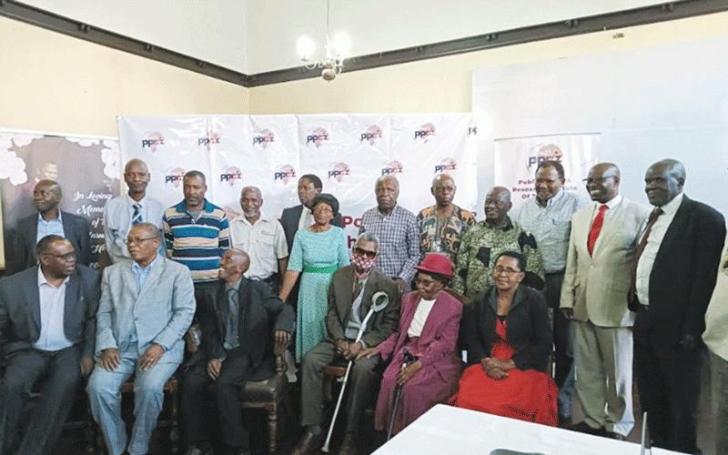News / National
'Ndema Ngwenya foretold present political, cultural, language crisis'
19 Oct 2024 at 11:10hrs |
0 Views

Describing Mthandazo Ndema Ngwenya simply as a novelist would be an understatement, as his intellectual work, political activism, and academic contributions foretold many of the political, cultural, and linguistic issues Zimbabwe faces today. This was highlighted by various speakers during Ngwenya's inaugural memorial lecture, organized by the Public Policy Research Institute of Zimbabwe (PPRIZ) and Ibhetshu LikaZulu in partnership with the Centre for Information Technology in Bulawayo, held on Thursday.
Born in Nkayi, Matabeleland North in 1949, Ngwenya tragically passed away in a car accident at Heaney Junction on October 19, 1992, alongside his friend Themba Nkabinde. His brief but impactful career in political activism and academic excellence established him as a champion of democracy, cultural development, and linguistic expertise.
Known for his celebrated IsiNdebele novels such as Umhaso Zhi Mthakathi, Ungcingci Kandoyi, and Ngitshilo Ngitshilo, Ngwenya's literary works became essential reading in Zimbabwean secondary and high schools. Yet, his influence extended far beyond literature.
Speaking at the memorial, academic and public policy researcher Samukele Hadebe, who had been mentored by Ngwenya, praised him as a visionary whose works and public lectures often predicted Zimbabwe's present-day challenges. Hadebe recalled how Ngwenya's sharp analysis of social and political issues enabled him to foresee problems related to democracy, development, and national unity.
In his 1992 Open Forum lecture in Bulawayo, Ngwenya had warned, "Our present national leaders are seeking national unity by methods that will create the very opposite. None of us want to pay the price of that folly, premeditated or inadvertent." This statement, made just five years after the 1987 Unity Accord, resonates even today, three decades later.
"Ngwenya was neither a prophet nor a clairvoyant, but an academic with deep intellectual insight into the prevailing societal trends and the balance of forces at play," Hadebe said. He explained that Ngwenya's intellectual rigor, particularly in the areas of democracy, decentralization, devolution, and nation-building, set him apart as a key thinker of his time.
Hadebe further emphasized Ngwenya's significant contributions to advancing the Ndebele language and literature. He described Ngwenya not only as an accomplished novelist but also as a literary critic whose critiques expanded understanding on state-building, democracy, and proportionality in governance.
Gorden Moyo, executive director of PPRIZ, echoed these sentiments, challenging Zimbabweans to raise the bar in promoting local languages and culture. Moyo stressed that the country's languages, particularly Ndebele, are facing serious threats and urged academics to re-engage in public discourse as Ngwenya had done. He called for a renaissance of intellectuals who, like Ngwenya, take their ideas into public forums and inspire change.
Ngwenya's widow, Elizabeth, his brother Sindiso Ngwenya (former secretary-general of the Common Market for Eastern and Southern Africa), and a host of academics including Themba Dlodlo, Peter Zwide Khumalo, and Reynard Khumalo, attended the memorial alongside members of civic society and local residents.
As Zimbabwe continues to grapple with issues of cultural preservation, democratic governance, and linguistic identity, Mthandazo Ndema Ngwenya's intellectual legacy remains a guiding light, offering insight and solutions for the challenges of today.
Born in Nkayi, Matabeleland North in 1949, Ngwenya tragically passed away in a car accident at Heaney Junction on October 19, 1992, alongside his friend Themba Nkabinde. His brief but impactful career in political activism and academic excellence established him as a champion of democracy, cultural development, and linguistic expertise.
Known for his celebrated IsiNdebele novels such as Umhaso Zhi Mthakathi, Ungcingci Kandoyi, and Ngitshilo Ngitshilo, Ngwenya's literary works became essential reading in Zimbabwean secondary and high schools. Yet, his influence extended far beyond literature.
Speaking at the memorial, academic and public policy researcher Samukele Hadebe, who had been mentored by Ngwenya, praised him as a visionary whose works and public lectures often predicted Zimbabwe's present-day challenges. Hadebe recalled how Ngwenya's sharp analysis of social and political issues enabled him to foresee problems related to democracy, development, and national unity.
In his 1992 Open Forum lecture in Bulawayo, Ngwenya had warned, "Our present national leaders are seeking national unity by methods that will create the very opposite. None of us want to pay the price of that folly, premeditated or inadvertent." This statement, made just five years after the 1987 Unity Accord, resonates even today, three decades later.
Hadebe further emphasized Ngwenya's significant contributions to advancing the Ndebele language and literature. He described Ngwenya not only as an accomplished novelist but also as a literary critic whose critiques expanded understanding on state-building, democracy, and proportionality in governance.
Gorden Moyo, executive director of PPRIZ, echoed these sentiments, challenging Zimbabweans to raise the bar in promoting local languages and culture. Moyo stressed that the country's languages, particularly Ndebele, are facing serious threats and urged academics to re-engage in public discourse as Ngwenya had done. He called for a renaissance of intellectuals who, like Ngwenya, take their ideas into public forums and inspire change.
Ngwenya's widow, Elizabeth, his brother Sindiso Ngwenya (former secretary-general of the Common Market for Eastern and Southern Africa), and a host of academics including Themba Dlodlo, Peter Zwide Khumalo, and Reynard Khumalo, attended the memorial alongside members of civic society and local residents.
As Zimbabwe continues to grapple with issues of cultural preservation, democratic governance, and linguistic identity, Mthandazo Ndema Ngwenya's intellectual legacy remains a guiding light, offering insight and solutions for the challenges of today.
Source - the herald
Join the discussion
Loading comments…


































